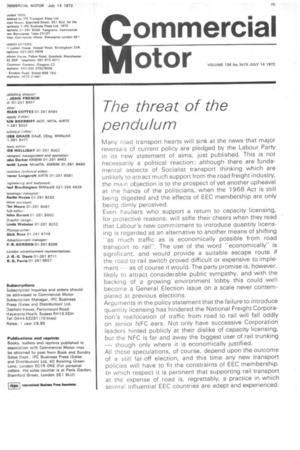The threat of the pendulum
Page 17

If you've noticed an error in this article please click here to report it so we can fix it.
Many road transport hearts will sink at the news that major reversals of current policy are pledged by the Labour Party in its new statement of aims, just published. This is not necessarily a political reaction; although there are fundamental aspects of Socialist transport thinking which are unlikely to attract much support from the road freight industry, the main objection is to the prospect of yet another upheaval at the hands of the politicians, when the 1968 Act is still being digested and the effects of EEC membership are only being dimly perceived.
Even hauliers who support a return to capacity licensing, for protective reasons, will stifle their cheers when they read that Labour's new commitment to introduce quantity licens ing is regarded as an alternative to another means of shifting "as much traffic as is economically possible from road transport to rail". The use of the word "economically" is significant, and would provide a suitable escape route if the road-to-rail switch proved difficult or expensive to imple ment as of course it would. The party promise is, however, likely to attract considerable public sympathy, and with the backing of a growing environment lobby this could well become a General Election issue on a scale never contemplated at previous elections.
Arguments in the policy statement that the failure to introduce quantity licensing has hindered the National Freight Corpora tion's reallocation of traffic from road to rail will fall oddly on senior NFC ears. Not only have successive Corporation leaders hinted publicly at their dislike of capacity licensing, but the NFC is far and away the biggest user of rail trunking — though only where it is economically justified.
All these speculations, of course, depend upon the outcome of a still far-off election, and this time any new transport policies will have to fit the constraints of EEC membership. In which respect it is pertinent that supporting rail transport at the expense of road is, regrettably, a practice in which several influential EEC countries are adept and experienced.






























































































